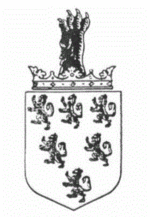Thomas Savage (bishop)
Dr Thomas Savage (1449, Clifton, Cheshire – 3 September 1507, Cawood, Yorkshire) was a prelate and diplomat during the Tudor period.
Thomas Savage | |
|---|---|
| Archbishop of York | |
| Appointed | 18 January 1501 |
| Installed | Never enthroned[1] |
| Term ended | 3 September 1507 |
| Predecessor | Thomas Rotherham |
| Successor | Christopher Bainbridge |
| Other posts | Bishop of Rochester Bishop of London |
| Orders | |
| Ordination | 1470 |
| Consecration | 28 April 1493 |
| Personal details | |
| Born | 1449 Clifton Hall, Cheshire |
| Died | 3 September 1507 Cawood Castle, Yorkshire |
| Buried | York Minster |
| Nationality | English |
| Denomination | Roman Catholic |
| Parents | Sir John Savage (1422–95) (f) Lady Katherine Stanley (m). |
Savage served as Chaplain to King Henry VII, becoming Archbishop of York in 1501.[2]
Family and studies

The second son of the many children of Sir John Savage (1422–1495) and Lady Catherine née Stanley, daughter of Lord Stanley,[3] Sir John Savage, KG, was his elder brother.
After graduating from Oxford University, proceeding Master of Arts c. 1473, Savage was sent abroad to further his studies in divinity, first at Bologna and then, in 1477, at the University of Padua, receiving a doctorate of Canon Law before serving there as Jurist Rector (1481–82).[4] He was awarded the degree of LLD (Cantab) in 1495.
Through Savage marriages with the various Cheshire county families, he was related to Archbishop Lawrence Booth.
Career
Savage was appointed Rector of Davenham, Cheshire, 1470; Rector of Jacobstow, Devon, 1474; Rector of Monks Risborough, Buckinghamshire, 1484; and Rector of Rostherne, Cheshire. Such advowsons provided him with a source of income whilst he pursued his diplomatic activities abroad.
He served as English ambassador to Castile and Portugal in 1488, and then to France in 1490, where he participated to no avail in the conference at Boulogne.
On 3 December 1492, Dr Savage was nominated as Bishop of Rochester being consecrated on 28 April 1493, a post he held until 1496 when he was translated to the see of London[5] As Bishop of London, Savage served as president of the council attendant on the king and dean of the household chapel of Henry VII, before being appointed on 18 January 1501 as Archbishop of York, which post he held until his death.[6][7] While Archbishop he led the marriage ceremony of Arthur, Prince of Wales, to Catherine of Aragon. Prince Arthur died young, and his brother Henry, who became Henry VIII, then married Princess Catherine.
"A Lancastrian in politics, he was much trusted and employed by Henry VII....he was a courtier by nature, and took part in the great ceremonies of his time, the creation of Prince Henry as Duke of York, the meeting with the Archduke Philip, and the reception of Catherine of Aragon."[8]
Death
Archbishop Savage's body is buried at York Minster where his effigy remains. His heart was later interred in the Savage Chapel of Macclesfield Church, Cheshire.[9]
Citations
- Jones, B., ed. (1963). "Archbishops of York". Fasti Ecclesiae Anglicanae 1300-1541: Volume 6, Northern Province (York, Carlisle and Durham). British History Online. London: Institute of Historical Research. pp. 3–5. Retrieved 24 November 2016.
- Sutherland, Douglas, 2007, p.724.
- The Visitation of Cheshire 1580 by several heralds, edited by John Paul Rylands, F.S.A., London, 1882, p.203–4.
- Richardson, Douglas, Magna Carta Ancestry, Baltimore, Md., 2007, p.724, ISBN 0-8063-1759-0
- Fryde, et al. Handbook of British Chronology p. 268
- Harriss, et al. Rulers and Ruled p. 242, Retrieved 24 November 2016
- Fryde, et al. Handbook of British Chronology p. 283
- Lee, Sidney, ed. (1897). . Dictionary of National Biography. 50. London: Smith, Elder & Co. p. 362.
- Richardson, Douglas, 2007, p.724
References
- Fryde, E. B.; Greenway, D. E.; Porter, S.; Roy, I. (1996). Handbook of British Chronology (Third revised ed.). Cambridge: Cambridge University Press. ISBN 0-521-56350-X.
- Harriss, G. L.; Archer, Rowena E.; Walker, Simon, eds. (1995). Rulers and Ruled in Late Medieval England. A&C Black. ISBN 9781852851330.
External links
| Catholic Church titles | ||
|---|---|---|
| Preceded by Edmund Audley |
Bishop of Rochester 1493–1497 |
Succeeded by Richard FitzJames |
| Preceded by Richard Hill |
Bishop of London 1497–1501 |
Succeeded by William Warham |
| Preceded by Thomas Rotherham |
Archbishop of York 1501–1507 |
Succeeded by Christopher Bainbridge |